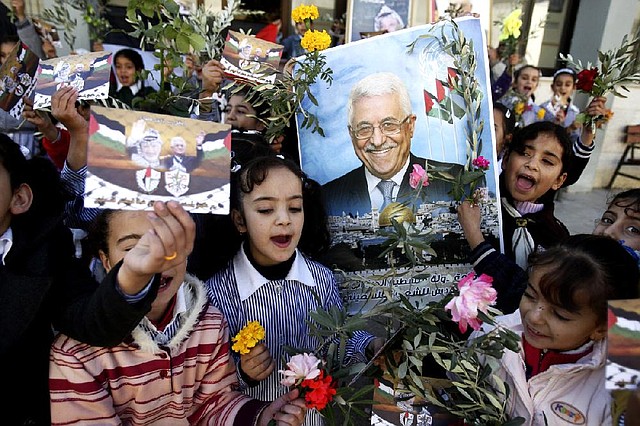Palestinian bid painted as peace step
Palestinian schoolgirls hold pictures of President Mahmoud Abbas with Yasser Arafat, flowers and olive branches during a rally Wednesday in the West Bank city of Nablus supporting the Palestinian bid to the United Nations for observer status.
Thursday, November 29, 2012
RAMALLAH, West Bank — A bid for U.N. recognition of a state of Palestine is a last-ditch attempt to rescue troubled Mideast peace efforts, a Palestinian spokesman said Wednesday, rejecting Israel’s claim that it is an attempt to bypass negotiations.
Meanwhile, as Western support swelled for the Palestinian effort, Israeli officials began to play down the significance of the draft resolution.
Today, Palestinian President Mahmoud Abbas plans to ask the U.N. General Assembly to recognize Palestine in the West Bank, Gaza and east Jerusalem, areas Israel captured in the 1967 Mideast war. Israel withdrew from Gaza in 2005 but still controls most access.
The Palestinians expect some two-thirds of the General Assembly’s 193 members will accept Palestine as a nonmember observer state. The U.S., Israel, Canada and a few others are opposed.
The vote will not change the situation, yet the Palestinians still say it is significant.
Germany said Wednesday that it won’t back the Palestinian drive — putting it at odds with France and other European countries, but in line with the U.S.
Hanan Ashrawi, a senior Palestinian official, urged the U.S. on Wednesday to drop its opposition to the bid, dismissing Washington’s stance as “pathetic” and harmful to American interests in the region. The Palestinians have come under intense pressure from the U.S., Britain and others to modify the bid but “have not succumbed,” she said.
Abbas has said U.N. recognition is not meant to replace negotiations with Israel, but to improve Palestinian leverage and secure the pre-1967 war frontiers as the base line for future border talks — an idea Israeli Prime Minister Benjamin Netanyahu has rejected.
This does not mean the U.N. vote will pave the way for a quick resumption of talks, which broke down four years ago.
Abbas has said he will not negotiate as long as Israel keeps expanding settlements on war-won land. Half a million Israelis now live in the West Bank and east Jerusalem, blurring the 1967 lines.
Beyond a 10-month partial halt in 2009 that failed to restart sustained peace talks, Netanyahu has refused to freeze construction in settlements.
Abbas aides have given conflicting accounts of whether U.N. recognition of “Palestine” would soften his demands for a settlement freeze ahead of any negotiations.
Referring to Israeli settlement building, Ashrawi said Wednesday that the U.N. bid “is a last-ditch effort, because we believe the two-state solution [a Palestinian state alongside Israel] is in jeopardy as a result of these actions.”
She said if the U.S. “can’t vote yes, at least don’t vote no, because that would be seen as being really pathetic by the rest of the world.”
Deputy U.S. Secretary of State William Burns met Wednesday with Abbas at his New York hotel in a last-minute attempt to halt the U.N. bid, Abbas aide Saeb Erekat said.
Burns told Abbas that the U.N. vote goes against U.S. interests and President Barack Obama would make a new push in 2013 to see a Palestinian state formed through negotiations, Erekat said. Burns “asked President Abbas to change his mind,” the aide said.
Abbas told Burns that the vote would take place today as planned, Erekat said.
Israeli government spokesman Mark Regev dismissed the U.N. quest as futile, saying only negotiations with Israel can bring about a Palestinian state.
While Regev acknowledged “a certain amount of disappointment” over the decision of some friendly European countries to support the Palestinians or abstain from the vote, he said the vote “will in no way affect the realities on the ground.”
“They can get pieces of paper from the U.N., but they are not going to move peace forward, they are not going to make a Palestinian statehood more real,” he said.
“They boycott Israel. They refuse to talk to us. Who do they plan to make peace with?” he said.
The vote comes at an important time domestically for Abbas, who has watched his political rival, the Islamic militant group Hamas, gain popularity, particularly after holding its own during an Israeli offensive on Hamas-ruled Gaza earlier this month. The military action was aimed at stopping almost daily rocket barrages from the Gaza Strip at southern Israel.
Hamas, which seized control of Gaza from Abbas in 2007, argues that negotiations with Israel are a waste of time, but Hamas leaders have come out in support of the U.N. bid in recent days.
Meanwhile, residents of the Gaza Strip on Wednesday plastered large billboards in key locations thanking Iran for its help during a recent eight-day battle against Israel.
The posters reflected the strong ties between Iran and the Hamas and Islamic Jihad militant groups in Gaza. Israel considers Iran to be its most dangerous enemy, citing Iran’s support for the militants and its suspect nuclear program.
During the fighting, Gaza militants groups fired hundreds of rockets into Israel, including Iranian-made “Fajr” missiles reaching as far as Tel Aviv and the outskirts of Jerusalem.
Israel has long accused Iran of funneling weapons into the Gaza Strip, but only recently have the militant groups openly acknowledged the origins of their arsenal.
Information for this article was contributed by Karin Laub, Amy Teibel, Ibrahim Barzak and staff members of The Associated Press and by Isabel Kershner of The New York Times.
Front Section, Pages 6 on 11/29/2012
